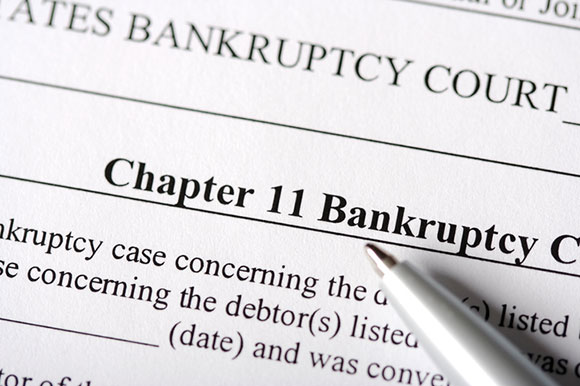No one hopes for a bankruptcy. The word alone often ignites feelings of anxiety and dread. However, bankruptcies are nothing to feared or be ashamed of, as they can often alleviate an extraordinary amount of stress and debt and give you hope again.
Further, the stereotype of an individual “losing everything” during a bankruptcy is inaccurate. Whether you are filing as an individual or a business, the bankruptcy filing process is not set up to rip you of everything you own and leave you with nothing – far from it. Read on for more details about the two, main bankruptcy options for business owners.
Chapter 13 Bankruptcy
If you are a sole proprietor of a business struggling with an unbearable amount of debts, filing for a Chapter 13 bankruptcy may help you to reorganize your debts and keep your business from going under. A Chapter 13 bankruptcy allows you to keep all of your assets and avoid selling them off; instead, you will work with a trustee to re-organize your debt and come up with a repayment plan.

The repayment plan typically lasts from 3-5 years, depending on your unique situation. Over the course of that period, you will make monthly payments to the bankruptcy trustee assigned to your case, and that trustee will pay your creditors according to your plan. Also to note: once a repayment plan has been established, your creditors no longer have the legal right to come after you for your debts, so the phone calls and letters will stop.
Determining how much of your debt you will need to pay back your creditors depends on your income, expenses, and the types of debts you have. Logically, the higher your income, the more you will be required to pay – although there are certain debts referred to as “priority debts” that must be repaid in full, regardless of your income. These priority debts include certain taxes and domestic support obligations, among several others. Once your repayment plan is complete (after 3-5 years, typically) the remainder of your debt will be discharged.
If you do not have enough income to pay your priority debts in full (along with the other payments you will be required to make) then reorganizing your business under Chapter 13 may not be the best option for you; instead you may consider Chapter 7 “liquidation” bankruptcy, described later in this article.
Key Points about Chapter 13 Bankruptcy
- You can choose to keep your business in operation, both during the bankruptcy process and afterwards
- You do not need to liquidate your assets
- You can not be a corporation or partnership (i.e. LLC, S-corp, C-corp) and file this option
- You can be a sole proprietor of a business and file this option
- This option does allow you to re-structure your debt and make monthly payment plans that typically last 3-5 years, at which point, the rest of your debt is discharged
- You can start a new business or LLC while going through the process of filing a Chapter 13 bankruptcy; however, speak with your attorney about this complex procedure
Chapter 7 vs. Chapter 11 Bankruptcy
Corporations and partnerships, which unlike sole proprietorships are separate from their owners, only have the option of filing for bankruptcy protection under either Chapter 7 or Chapter 11. Each has different options that are best to explore with a bankruptcy attorney who can help advise you on which option may be best for your business entity. To note: businesses run by sole proprietors may also file for Chapter 7 bankruptcy if they don’t want to (or don’t qualify for) Chapter 13 bankruptcy; and, they may file for Chapter 11 bankruptcy if their income is too high to qualify them for Chapter 13 bankruptcy.
Chapter 11 Bankruptcy
Chapter 11 bankruptcy is somewhat similar to Chapter 13 but for corporations and partnerships (instead of sole proprietors.) Though, this form of bankruptcy can also be considered by sole proprietors whose income is too high to qualify for Chapter 13.
Consider this form of bankruptcy if you believe you have a realistic chance at turning things around and you would like to keep your business in operation. This option allows corporations and partnerships to reorganize or restructure their debt into a plan that has them pay a portion of their debt to their creditors and discharge the rest of their debt once the business returns to profitability.
A restructuring plan will be presented by the court-appointed trustee (who works in collaboration with you, the business owner filling for Chapter 11) to the creditors, at which point the creditors will vote on the plan. If the court finds the plan equitable and fair, the plan will be approved. At that point, an agreed-upon payment plan will begin. Typically, you will pay your monthly payment for 3-5 years.

Important note: in August of 2019, the Small Business Reorganization Act of 2019 was passed in Congress and signed into law by the President. This enacts a new subchapter of Chapter 11 and has been in effect since February 20, 2020. This new subchapter is said to favor the applicant for business bankruptcy, and you can choose to apply for this or not.
Some of what this subchapter allows is: you are not required to have a committee of creditors that you meet with and, thus, that committee does not have to approve of the court plan. To be eligible for this chapter, your business debt (secured and unsecured total) must be less than $2,725,625. At least half those debts much come from business activity, and your principal activity cannot be a single-asset real estate operation.
This process is said to move much faster than a traditional Chapter 11 bankruptcy. So, why would anyone choose the regular Chapter 11 over this option? Speak with a qualified bankruptcy attorney to find out more details of this intricate process.
Key Points about Chapter 11 Bankruptcy
- You can choose to keep your business in operation, both during the bankruptcy process and afterwards
- You do not need to liquidate your assets
- You can be a corporation or partnership (i.e. LLC, S-corp, C-corp) and file this option
You can be a sole proprietor of a business and file this option, under certain conditions - This option does allow you to re-structure your debt and make monthly payment plans that typically last 3-5 years, at which point, the rest of your debt is discharged
- There is a new, sub-chapter that allows more freedom on your part, less restrictions, and a faster completion time; see an attorney for details
- You can start a new business or LLC while going through the process of filing a Chapter 11 bankruptcy; however, speak with your attorney about this complex procedure

Chapter 7 Bankruptcy
This is typically the best option if, and only if, your business sees no viable future. This form of bankruptcy is referred to as “liquidation” bankruptcy for businesses. If the debts of your business are extremely overwhelming and restructuring your business is not feasible, Chapter 7 bankruptcy is an option.
This option is often used if a business is entirely overwhelmed with debt and does not hold any substantial assets. Before a Chapter 7 filing can be made, the applicant must take a “means” test. If the applicant’s income is over a certain level, their application will not be approved. However, if the application is approved, at that point, the process of dissolving the business begins.
During a Chapter 7 bankruptcy, a trustee is assigned by the court to take possession of the business assets and distribute them to the creditors. After the assets are distributed, a sole proprietor will receive a discharge and be released from additional debts.
To note: partnerships and corporations do not receive a discharge. Please speak with an attorney regarding this point, because it’s important you don’t leave yourself open to lawsuits from creditors who may attempt to come after your personal assets.
Key Points about Chapter 7 Bankruptcy
- Your business will not remain in operation after this process is complete because it will be dissolved in order to pay creditors
- You will need to liquidate your business assets to pay creditors
- You can be a corporation or partnership (i.e. LLC, S-corp, C-corp) and file this option
- You can be a sole proprietor of a business and file this option
- This is typically only a good option if your business has an extraordinary amount of debt and re-structuring with a payment plan is out of the question.
- If you decide to start a new business or LLC while going through the process of filing Chapter 11, the bankruptcy courts can count that new business as an asset within your estate and try to sell it to settle your debts; for that reason, it is not advised to start a new business while going through this chapter.





